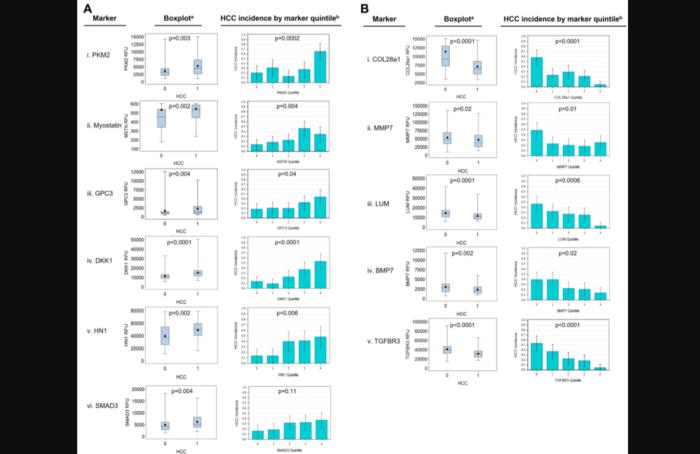“A fundamental hypothesis we sought to test was whether biomarkers from the TGF-β signaling pathway might be of novel value in risk stratification of HCC in the clinical cirrhotic setting.”

Credit: 2024 Xiang et al.
“A fundamental hypothesis we sought to test was whether biomarkers from the TGF-β signaling pathway might be of novel value in risk stratification of HCC in the clinical cirrhotic setting.”
BUFFALO, NY- February 9, 2024 – A new research paper was published in Genes & Cancer on February 5, 2023, entitled, “Mechanistically based blood proteomic markers in the TGF-β pathway stratify risk of hepatocellular cancer in patients with cirrhosis.”
Hepatocellular carcinoma (HCC) is the third leading cause of death from cancer worldwide but is often diagnosed at an advanced incurable stage. Yet, despite the urgent need for blood-based biomarkers for early detection, few studies capture ongoing biology to identify risk-stratifying biomarkers.
In this new study, researchers Xiyan Xiang, Krishanu Bhowmick, Kirti Shetty, Kazufumi Ohshiro, Xiaochun Yang, Linda L. Wong, Herbert Yu, Patricia S. Latham, Sanjaya K. Satapathy, Christina Brennan, Richard J. Dima, Nyasha Chambwe, Gulru Sharifova, Fellanza Cacaj, Sahara John, James M. Crawford, Hai Huang, Srinivasan Dasarathy, Adrian R. Krainer, Aiwu R. He, Richard L. Amdur, and Lopa Mishra, from The Feinstein Institutes for Medical Research, Cold Spring Harbor Laboratory, University of Maryland, University of Hawaii, University of Hawaii Cancer Center, The George Washington University, North Shore University Hospital, Northwell Health, Hofstra Northwell School of Medicine, Cleveland Clinic, and Georgetown Lombardi Comprehensive Cancer Center, address this gap using the TGF-β pathway because of its biological role in liver disease and cancer, established through rigorous animal models and human studies.
“Alterations in the TGF-β signaling pathway could reflect a continuum of fibrosis to cirrhosis to cancer in the liver. Thus, we hypothesize that the TGF-β pathway-enriched biomarkers may serve as biomarkers in the evolution of HCC and stratify patients at risk for HCC. In addition, we hypothesized that the integrated animal model-to-human studies program would yield new TGF-β driven mechanistic biomarkers that could be valuable in yielding additional biomarkers that could stratify the risk of HCC.”
Using machine learning methods with blood levels of 108 proteomic markers in the TGF-β family, the team found a pattern that differentiates HCC from non-HCC in a cohort of 216 patients with cirrhosis, which they refer to as TGF-β based Protein Markers for Early Detection of HCC (TPEARLE) comprising 31 markers. Notably, 20 of the patients with cirrhosis alone presented an HCC-like pattern, suggesting that they may be a group with as yet undetected HCC or at high risk for developing HCC.
In addition, the researchers found two other biologically relevant markers, Myostatin and Pyruvate Kinase M2 (PKM2), which were significantly associated with HCC. They tested these for risk stratification of HCC in multivariable models adjusted for demographic and clinical variables, as well as batch and site. These markers reflect ongoing biology in the liver.
“They potentially indicate the presence of HCC early in its evolution and before it is manifest as a detectable lesion, thereby providing a set of markers that may be able to stratify risk for HCC.”
Read the full study: DOI: https://doi.org/10.18632/genesandcancer.234
Correspondence: Lopa Mishra, Richard L. Amdur – Emails: [email protected], [email protected], [email protected]
Keywords: TGF-β, hepatocellular carcinoma, myostatin, pyruvate kinase M2, biomarker
About Genes & Cancer: Genes & Cancer covers all aspects of the structure and function of oncogenes, growth suppressor and apoptotic genes, their role in signal transduction and the mechanisms by which their expression and function are altered during tumor development. In addition to publishing manuscripts that directly relate to these areas of research, Genes & Cancer also aims to attract papers in the areas of genomics, drug development and systems biology.
To learn more about Genes & Cancer, visit www.genesandcancer.com and connect with us on social media:
- X, formerly Twitter
- YouTube
For media inquiries, please contact: [email protected].
Genes & Cancer Journal Office
6666 East Quaker Str., Suite 1C
Orchard Park, NY 14127
Phone: 1-212-659-5400
###
Journal
Genes & Cancer
DOI
10.18632/genesandcancer.234
Method of Research
Observational study
Subject of Research
People
Article Title
Mechanistically based blood proteomic markers in the TGF-β pathway stratify risk of hepatocellular cancer in patients with cirrhosis
Article Publication Date
5-Feb-2024



